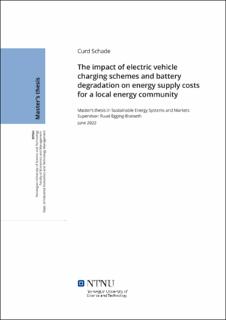| dc.description.abstract | Optimal energy management becomes increasingly important in the future energy system. The increasing share of intermittent energy sources, such as solar power, requires additional flexibility in the system to balance supply and demand. Batteries are a solution for this increasing need for flexibility. The majority of techno-economic models in the literature overly simplify the representation of battery degradation.
Especially in dynamic and uncertain settings, accounting properly for battery degradation will allow for better cost-effective trade-offs and optimization of battery usage.
In the first part of this thesis, we propose scalable model formulations for battery degradation, considering the impact of Cycle Depth (CD) and the State of Charge (SOC) on calendar and cycle aging of the battery.
We set up a simple price arbitrage model, where for given market prices, a model decides electricity trades, battery charges and discharges of electricity, to maximize profit. We investigate how a better representation of degradation affects charging and discharging patterns.
The results show the importance of an accurate representation of battery degradation. In a setup ignoring battery degradation, an ex-post calculation of degradation costs reveals hidden costs that exceed the revenues and hence turn what seem to be profitable trades into losing trades. We observe that considering battery degradation leads to smaller CDs and a lower average SOC. Overall we show that a much-improved representation of battery degradation is possible and that two of the three degradation mechanisms can be represented very well at a low computational cost.
In the second paper, we use the resulting degradation model in a stochastic model for an urban neighborhood to analyze the interplay between Electric Vehicle (EV) charging schemes and battery usage and degradation, and their impact on the energy costs of the local neighborhood.
We propose a model incorporating PV modules, a combined heat and power plant (CHP), a stationary battery, and multiple EVs. We first analyze the neighborhood in a deterministic setting to assess the impact of passive, smart, and vehicle-to-grid (V2G) charging strategies. Here we find that the smart charging is already sufficient in reducing the system costs and V2G charging provides no significant added benefits.
The final analysis concerns multistage stochastic cases in which we incorporate uncertainty in electricity prices and arrival SOCs of the EVs. Here we find that the V2G charging scheme can cope much better with the uncertainty resulting in up to 2.1\% reduction in total system costs with a switch from smart to V2G charging.
With these two papers, this thesis provides several contributions to the academic literature.
First, we show that it is possible to reflect more than 90\% of the actual battery degradation using functional forms that scale well in techno-economic mathematical programming models, including the economic dispatch of batteries.
Second, we compute how much otherwise \emph{hidden} battery degradation costs can be and how relatively minor schedule adjustments can considerably mitigate the battery degradation.
Third, we analyze that the flexibility of smart charging strategies, i.e., allowing a model to choose the best times to charge rather than passive charging from the moment an electric vehicle is plugged in, provides a significant part of the benefits of a vehicle-to-grid strategy. However, the value of vehicle-to-grid becomes larger when uncertainty increases.
Fourth, based on our observations, we list conditions that are critical success factors for the profitability of vehicle-to-grid. | |
